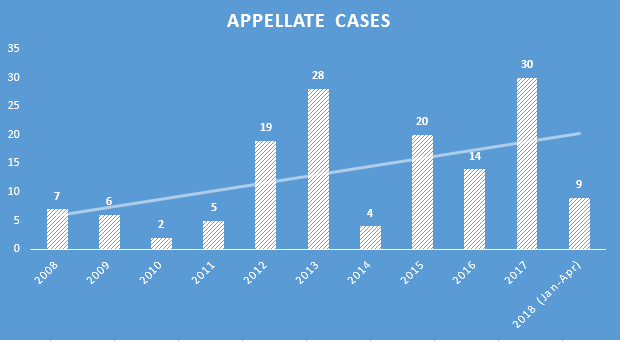A blue whale grows more than thirty pounds a day and doubles in size in its first six months of life. Every developer wants to land the whale of a deal. Many big deals in the District of Columbia require complicated entitlements before the Board of Zoning Adjustment or the Zoning Commission. Unfortunately, the District’s zoning world has fallen prey to a growing number of challenges before the DC Court of Appeals, and the court is only feeding the problem.
What we are seeing is not only an increase in zoning cases that are being appealed, but also greater scrutiny from the Court of Appeals over decisions made by the Board of Zoning Adjustment or the Zoning Commission. Simply put, the Court of Appeals is demonstrating a willingness to vacate and remand zoning decisions. This has happened twice in April 2018 alone, including for the redevelopment of the St. Thomas’ Episcopal Parish building in DuPont Circle and a PUD in Barry Farm.
The sheer number of appellate cases is startling. Since January 2016, a period of a little more than two years, there have been fifty-three appeals of decisions made by the Board of Zoning Adjustment or the Zoning Commission. Compare this to only seventy-one appeals in the preceding four years between January 2012 and December 2015.

Of the nine most recently published appellate opinions relating to the Board of Zoning Adjustment or the Zoning Commission, six of those cases were remanded for further consideration by the Board of Zoning Adjustment or the Zoning Commission. Compare these numbers to the preceding ten published decisions, six of which upheld Board of Zoning Adjustment/Zoning Commission decisions, and the appellate trend is clear.
Parsing recent rulings of the Court of Appeals offers additional insight into the increased level of scrutiny for zoning cases. The court made big waves in a December 2016 decision about the highly-publicized development of the McMillan Sand Filtration Site in the Edgewood neighborhood of Northeast DC. Despite affirming the Zoning Commission’s conclusion that there could be high-density development on the site, the Court of Appeals required an explanation as to why the District’s Comprehensive Plan might favor that policy over a competing policy calling for moderate- to medium-density development at the site. The Court of Appeals also challenged the Commission’s conclusions about the development’s effects on gentrification and increased land values in the nearby area. This emphasis on the issue of gentrification was reinforced in the Barry Farm decision. Such hot-button topics were previously thought to be outside the scope of zoning review, but it is clear that the court is calling for the commission to consider these issues.
The Court of Appeals has also ratcheted up expectations for how the Board of Zoning Adjustment and the Zoning Commission should be drafting orders. In a recent review of an apartment development in Logan Circle, the court gave the Board of Zoning Adjustment a proverbial slap on the wrist for “verbatim adoption” of the applicant’s proposed order. The court took a clear dig at the Board of Zoning Adjustment, claiming the board had adopted the mantra of: “You won; now tell me why.” In another case, the court “reminded” the board of its duty to fully explain the reasoning for its conclusions. Indeed, the Board of Zoning Adjustment and Zoning Commission have taken note, as orders have ballooned from a length in the neighborhood of 30 pages to as large as 161 pages.
These appellate cases should not discourage development. Instead, these cases should serve as a guideline for how to approach zoning entitlement applications in the coming years. When presenting a case, developers should provide attention not only to the policies and legal standards in favor of the development, but also offer an explanation as to why other relevant policies may be discounted. The onus will also be on the Board of Zoning Adjustment and the Zoning Commission to button-up their orders. While this may increase the timeline until an applicant can receive an order of approval, the extra wait will be worth it if the case would otherwise be appealed.

